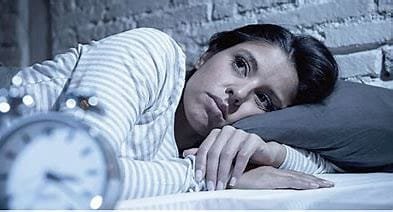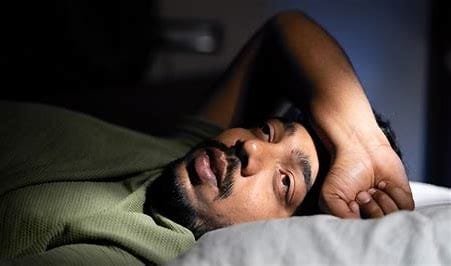Introduction

Millions of people worldwide are afflicted with the most common sleep disorder, insomnia.
This disorder prevents people from falling asleep, sleeping, or waking up early, making them unable to return to sleep. People wake up feeling tired after having slept for an entire night. While a nuisance to most, for others, insomnia may become a chronic condition where sleep loss will seriously compromise the body’s condition and mental status and considerably reduce a person’s standard of living. Insomnia, if left unattended, can lead to or exacerbate an already emerging mental condition and should not be neglected with such an important intervention either.
Generally, insomnia is divided into acute and chronic types.
Acute Insomnia
Usually, acute insomnia is transient and associated with an identifiable triggering event or stressor such as a bad day at work, test anxiety, or a traumatic event. It can last from a few days to a few weeks but usually subsides with the resolution of the causal factor.
Chronic Insomnia
Chronic insomnia lasts for three or more nights a week for three months or more. Causes for chronic insomnia are complex, often multifactorial, but involve a relation to a medical condition, psychological factor, or lifestyle factor. Anxiety disorders, depression, chronic pain, respiratory conditions, and substance misuse involving caffeine, alcohol, or prescription medications account for many of the cases.
Both forms of insomnia have a ripple effect on mental health; however, chronic insomnia is more severe and prolonged.
Effects of insomnia on the mind sleep are integral to mental and emotional resistance. It has an impact on cognitive functions like consolidation of memory, problem solving, emotional regulation, and stress response. Insomnia interferes with these processes and, over time, has an impact on the brain and body from chronic sleep deprivation.
Defective Cognitive Ability
Not getting quality sleep would drastically impair a person’s cognitive functions, such as memory, attention span, problem-solving ability, and decision-making capabilities. It means that a person suffering from sleep disorders may experience “brain fog,” where mental confusion and the loss of concentration make it almost impossible to accomplish tasks around the home or succeed in work or school. Long-term impairments in cognitive ability led to a decline in life satisfaction and productivity.
Mood Disorders
Mood disorders are one of the most direct effects of insomnia. Poor sleep quality will cause irritation, anxiety, and even aggression. Gradually, this forms a vicious cycle because the person who lacks sleep might worry more about the lack of sleep, further deteriorating his or her mood and the insomnia itself. Research has shown that sleeplessness is highly associated with the onset of mood disorders such as depression and anxiety. Indeed, insomnia is a symptom but also predicts mood disorders.
Risk of Depression
In all respects, there is an excellent, well-established connection between insomnia and depression. People suffering from insomnia stand at 10 times increased risk of developing depression. Their chances of developing any type of depression are estimated to be tenfold higher than among the healthy population. Again, while insomnia can easily augment already existing depressive manifestations, depression can also escalate manifestations of insomnia, presenting something known as the “chicken-and-egg problem.”
Continuous sleep deprivation tends to modify neurotransmitters related to mood regulation, thereby aggravating depressive symptoms.
Anxiety and panic disorders
Anxiety and sleeplessness go hand in hand. The amygdala of the brain, a part responsible for processing fear and emotions, becomes more active and reactive if we do not get sufficient sleep. We tend to become more alert, thus increasing our level of anxiety because the body will feel threatened or in danger. The impact is compounded for the individual diagnosed with an anxiety disorder. There will be greater difficulty to sleep or fall asleep since their brain remains heightened and unable to relax, a by-product of remaining in the alert state.
This might further affect the body’s response to stress, commonly known as the hypothalamic-pituitary-adrenal, or HPA axis. The HPA axis oversees the production of cortisol; this is the primary hormone responsible for stress in a body. In cases involving insomnia, cortisol tends to remain elevated, hence having a constant “fight or flight” state that bears the effects on not just psychological well-being but also upon physical health with the arising problems such as hypertension, immunosuppression, and digestive problems.

Insomnia and Physical Health
While the primary focus of insomnia is on mental health issues, the physical effects of the condition on the human body cannot be ignored either. Chronic insomnia causes heart diseases, obesity, diabetes, and a poorly working immune system. Combined mental and physical health issues establish a cycle where each problem negatively affects the other, exacerbating the chances of cure in cases of insomnia.
Breaking the Cycle: Effective Treatments and Strategies
Insomnia treatment involves both symptom and root cause combat. Fortunately, there are many treatments to choose from:
Cognitive Behavioral Therapy for Insomnia (CBT-I).
CBT-I is an effective and evidence-based program to change thoughts and behaviors about sleep. The therapy helps individuals learn to identify and change any belief that they have that contributes to sleep anxiety, practice relaxation techniques, and establish better sleep habits.
Sleep Hygiene Practices
Many good sleep hygiene-promoting behaviors prevent insomnia or significantly reduce the severity of insomnia. Good sleep hygiene habits include identical bedtime and wake time, avoiding caffeine and alcohol near bedtime, keeping the sleep environment dark and noise-free, and not sleeping in front of the screens just before bedtime.
Medications
For those who don’t respond to therapy, there are medications that can be prescribed. These are the short-term sedative-hypnotics or supplements with melatonin. Still, medication should always be last because sometimes it could make insomnia worse if it’s not used properly.
Mindfulness and relaxation techniques
Relaxation techniques such as meditation, deep breathing, and progressive muscle relaxation would relieve the tension and anxiety typically associated with sleeplessness. All of these practices relax the nervous system, and hence a person would be more easily able to sleep.
Exercise and Diet
Regular exercise and a balanced diet play a big role in ensuring quality sleep. Physical activity helps regulate the circadian rhythms and minimizes stress, while a healthy diet minimizes interruptions caused by sugar or stimulants like caffeine.
The Takeaway

Insomnia is not just a nuisance but a condition that has far-reaching consequences for mental and physical health. Whereas sleeplessness is a very common experience that occurs from time to time, chronic insomnia calls for proper intervention before things get worse. A combination of therapy, healthy lifestyle adjustments, and stress management can help improve sleep quality and general well-being significantly.
Early treatment of insomnia is a preventive measure against the potential mental health problems caused by long-term sleep deprivation.



